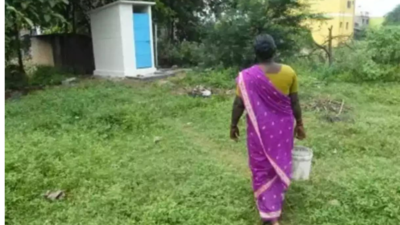[ad_1]

NEW DELHI: Over 90 per cent of villages in Punjab, Madhya Pradesh, Uttar Pradesh and Bihar have achieved Open Defecation Free (ODF) Plus status, the Jal Shakti ministry said on Tuesday. Open Defecation Free (ODF) Plus is an advanced sanitation benchmark under the Swachh Bharat Mission (SBM), aimed at sustaining and enhancing the outcomes of ODF status.
While the ODF status is achieved when a community eliminates open defecation practices, ODF Plus goes a step further by focusing on the sustainability of this status and integrating broader sanitation and waste management objectives.
Punjab and Uttar Pradesh have reported 98 per cent ODF Plus status, while Madhya Pradesh leads with 99 per cent of villages meeting the ODF Plus criteria, including 95 per cent achieving the advanced ODF Plus Model status. Bihar, although slightly behind, has reached 92 per cent ODF Plus coverage.
Union Jal Shakti Minister CR Patil lauded these achievements during a high-level review meeting with state officials and mission directors, according to an official statement.
He emphasised that sanitation is more than just an infrastructure goal, describing it as “a behavioral mission that shapes the health and dignity of rural communities”.
The meeting, held to assess progress and address challenges, highlighted innovative approaches and state-specific strategies to advance rural sanitation.
Punjab has integrated grey water management in 87 per cent of its ODF Plus villages and is now focusing on strengthening its solid waste management systems.
Madhya Pradesh has been a standout performer, not only achieving near-universal ODF Plus status but also introducing innovative plastic waste management initiatives through partnerships with recyclers.
Uttar Pradesh showcased its extensive workforce of over 1 lakh personnel trained to implement SBM-G objectives and highlighted its waste-to-energy initiatives and kabadiwala linkages.
Bihar, while progressing steadily, is concentrating on underperforming districts, achieving 91 per cent coverage in grey water management and 80 per cent in solid waste management.
Patil stressed the importance of bridging gaps in waste management and verifying ODF Plus Model villages through robust monitoring systems.
He also called for community-led approaches, encouraging active participation from women’s self-help groups, local leaders, and private enterprises.
“Sanitation is a movement of the people, by the people, and for the people,” he said, underscoring the need for collective ownership to sustain the mission’s progress.
The minister reaffirmed the government’s commitment to Sampoorna Swachhata (comprehensive cleanliness) which extends beyond sanitation to include water conservation, waste management, and community well-being.
By aligning the mission with global goals such as SDG 6 (Clean Water and Sanitation) and SDG 3 (Good Health and Well-being), the Swachh Bharat Mission aims to transform rural India into a model of resilience and sustainable development.
“This is not just about meeting targets’¦It is about creating ecosystems of health, dignity, and self-reliance, ensuring every village becomes a beacon of cleanliness and sustainable development,” he said.
[ad_2]
Source link


